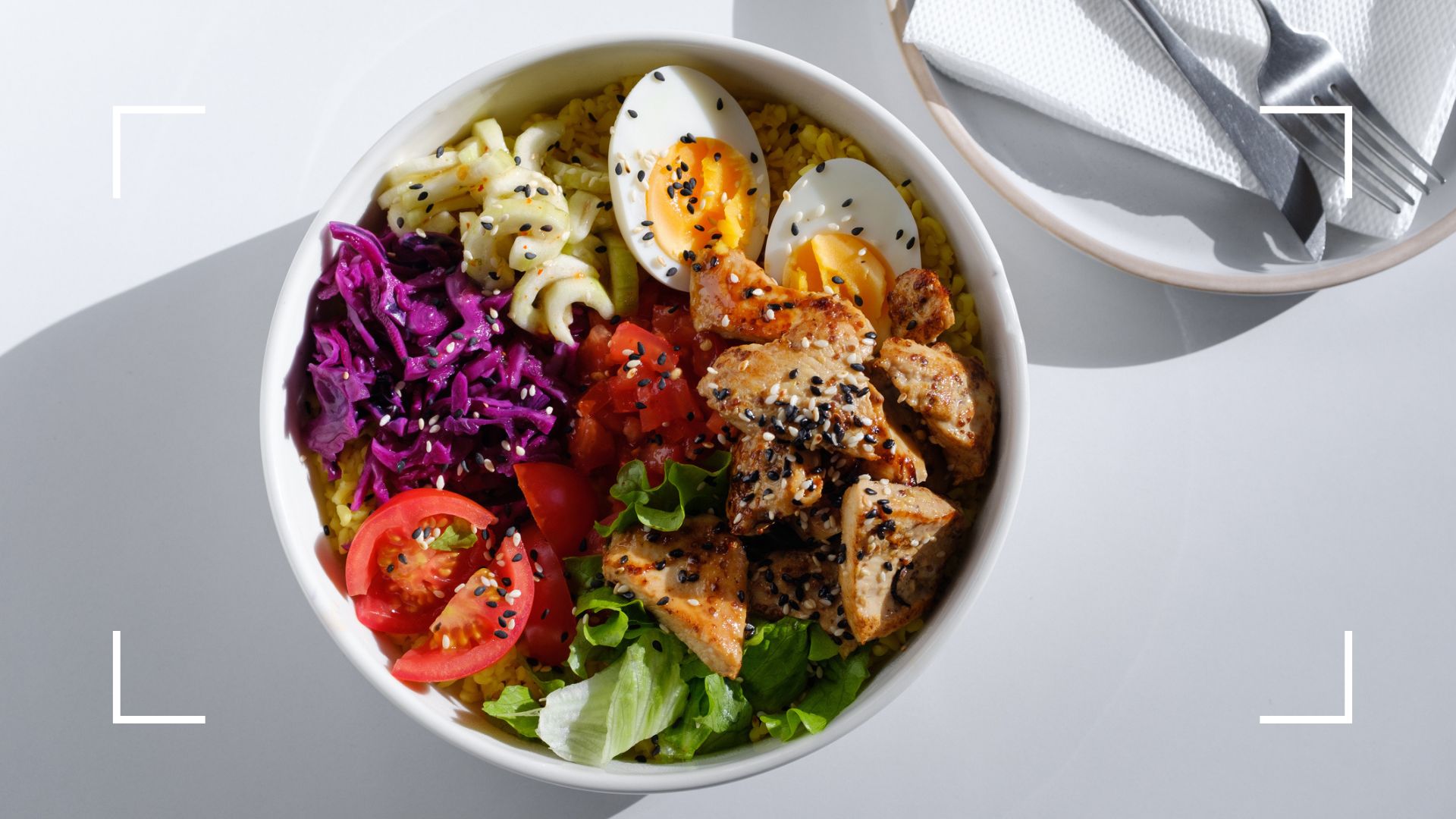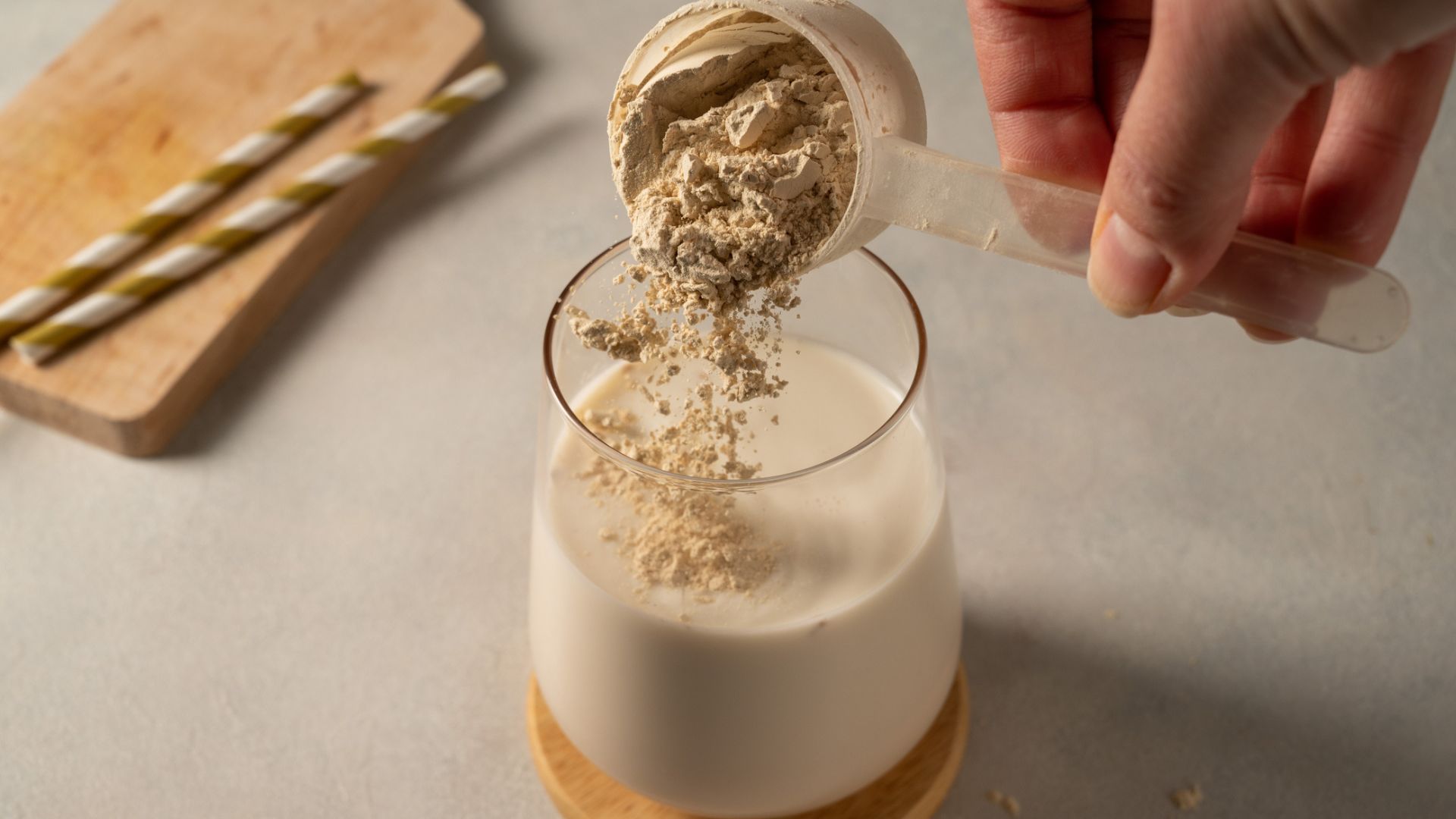What happens if you eat too much protein? Plus, how much you should really be eating
Many of us are wondering what happens if you eat too much protein as we try to up our intake for better health. But how much is too much protein?


What happens if you eat too much protein? It's a question many of us are asking these days, considering the surge in attention around high-protein diets and their benefits for our health.
From keeping hunger at bay to helping maintain muscle mass through menopause, we have much to gain from adding more protein to meals or investing in one of the best protein powders for women. Yet, it needs to be a balance just like everything else. "We need a variety of nutrients, both macro- and micronutrients and an individual amount of daily energy," says Signe Svanfeldt, a certified nutritionist. "Protein is vital for our body and needed for a variety of bodily functions such as the working of our enzymes, hormones, cells and muscles, but eating too much protein can lead to negative consequences and an unbalanced diet."
So what are the signs that protein has taken over your diet? Here, woman&home speaks to two certified nutritionists to reveal the signs you need to cut back, how much you should be eating instead, and what that looks like on a plate.
What happens if you eat too much protein?
1. You experience digestive issues
The number one sign that you're eating too much protein is digestive issues. "Excessive protein intake can cause discomfort such as constipation, bloating, and diarrhoea," says Lisa Lorraine Taylor, a certified nutritionist and personal trainer.
"This is because high levels of protein can overwhelm the digestive system, particularly if fibre intake is not sufficient," she adds.

Lisa Lorraine Taylor, owner of Taylor Made Fitness, is a certified Personal trainer, holistic nutritionist, PN Level 1, health coach, university instructor and group instructor. Lisa’s mission for over 25 years has been to help others through all the misinformation and hype regarding health and fitness, as well as to empower people of all ages to live, love, and learn how to move their bodies daily for lasting health, happiness, and confidence. She is also an author at Total Shape.
2. You feel thirsty all the time
High protein diets can lead to dehydration, especially if you don't drink a lot of water, says Taylor. "This happens because the body uses more water to metabolise the increased amount of protein."
In general, advice from the NHS suggests we should be drinking six to eight cups of liquid a day, which roughly translates to three litres or more. This includes water, low-fat milk, tea, and coffee.
Sign up for the woman&home newsletter
Sign up to our free daily email for the latest royal and entertainment news, interesting opinion, expert advice on styling and beauty trends, and no-nonsense guides to the health and wellness questions you want answered.
3. You start to gain unwanted weight
As protein contains calories, eating above your calorie maintenance level will cause you to gain weight. This is especially the case if you opt for certain sources of protein over others, notes Taylor. "Sources like red meat, full-fat dairy products, and protein shakes are often high in fat and calories, and excess calories from any source, including protein, can lead to weight gain," she says.
If you want to lose weight, you need to be in a calorie deficit, which is where you eat fewer calories than you burn every day, and eat the recommended amount of protein to lose weight.
4. You have bad breath
Bad breath is one of the more short-term, immediate effects of eating too much protein, especially if you're on a high-protein diet that restricts other food groups like carbohydrates.
Protein is essentially a collection of amino acids. According to Texas AM University, when the body can't break down the excess protein intake, it causes an excess of these amino acids to float around our bloodstream. Here, the acids combine with anaerobic bacteria, which cause cavities and decay in our mouths.
The result? A sulfur compound that leads to bad breath. It's a nasty, almost-fruity smell that brushing and flossing can't shift. Lowering your protein intake and drinking more water is the only solution - and some chewing gum to mask the smell in the meantime.

Before adding additional protein to your diet with a powder, work out how much you're already eating every day.
5. You become more susceptible to a nutrient deficiency
While this tends to be in extreme cases, with many people swapping to a high-protein diet, it can become a problem. "If you only eat high-protein foods, while not including other kinds of food groups in the diet - such as vegetables and healthy fats (found in nuts, olive oil, avocado) - you might not get a variety of nutrients needed and you could lack certain vitamins in your diet such as vitamin C," says Svanfeldt, who works with healthy eating app Lifesum. "A too-unbalanced diet over time could also lead to nutrient deficiencies."
You'll need a blood test to diagnose a nutrient deficiency, but the typical signs include:
- Brittle hair and nails
- Dry skin
- Mouth ulcers or cracks in the corners of your mouth
- Hair loss
- Fatigue
- Slow-healing wounds
- Difficulty seeing at night

Signe is a food science and nutrition specialist and works as an in-house nutritionist at Lifesum. She helps the Lifesum community understand food and the effect it has on our physical and mental health. She is currently pursuing her Master's degree in food science and nutrition and enjoys helping people make healthier eating choices.
Does excess protein turn into fat?
Yes, after meeting the body's needs, surplus protein is used for energy or converted to glucose, explains nutritionist and PT Taylor. "Unused glucose can be stored as fat but this storage depends on total calorie intake and happens when overall calorie consumption exceeds energy needs," she says.
For those eating more protein to try and lose weight, a selection of the best high-protein, low-calorie foods and one of the best protein shakes for losing weight may be helpful.
How much protein is enough?
"To maintain muscle mass, active individuals should consume about 1.2 to 1.7 grams of protein per kilogram of body weight daily," says Taylor. Some of us need more protein than others though. If you exercise regularly, whether that's Pilates every day or a run a couple of times a week, or if you are going through the symptoms of menopause then you should aim for the upper limit of protein intake.
Although there are many benefits of protein powder for women, if you don't fall into either one of these groups, it's best to stick to the lower limit to avoid what happens if you eat too much protein.
You can find your perfect protein intake with a protein calculator but, for example, the average woman in the UK weighs 72.1kg. Someone matching this weight should aim for about 86 to 122g of protein every day to maintain their muscle mass, alongside exercise between one and three days per week.
What does this look like?
- Chicken breast: One of the most popular protein sources, an 85g serving offers 27g of protein. "If two of your meals include [this serving of chicken], that's 54 grams from chicken alone," says Taylor.
- Eggs: "One large egg has about 6.3g of protein. If you consume 4 eggs throughout the day (in any form, like boiled or as part of a dish), that adds approximately 25.2g of protein," she says. This is about the same as one healthy portion of protein powder.
- Edamame: One of the best high-protein snacks around, there are 11g of protein to be had in 100g of this bean.
- Lentils: 250g of uncooked lentils can offer an impressive 18g of protein, so combine this with chicken and edamame in a salad and you've almost sorted your protein intake for the day.
- Cheese: Whether you grate it onto your lentil bolognese or have it on a cracker, 100g of classic cheddar cheese has 25g of protein.
- Peanuts: 100g of peanuts (raw, not peanut butter) can offer 26g of protein.
As much as eating too much protein can cause negative short-term consequences, if you eat too much protein and specific sources of protein over others, it can have long-term negative effects as well. For instance, along with nutrient deficiencies, Svanfeldt says that eating an excessive amount of protein from red meat can lead to an increased risk of cancer.
"It is not recommended to eat more than 400g of red meat every week," she says. "A great way of decreasing the consumption of red meat while increasing the amount of fibre in the diet is to swap half the amount of meat to legumes [or another vegan protein] instead."

Grace Walsh is woman&home's Health Channel Editor, working across the areas of fitness, nutrition, sleep, mental health, relationships, and sex. She is also a qualified fitness instructor. In 2025, she will be taking on her third marathon in Brighton, completing her first ultra marathon, and qualifying as a certified personal trainer and nutrition coach.
A digital journalist with over seven years experience as a writer and editor for UK publications, Grace has covered (almost) everything in the world of health and wellbeing with bylines in Cosmopolitan, Red, The i Paper, GoodtoKnow, and more.
-
 Need spring style inspiration? Jennifer Aniston proves a shirt dress is the most versatile item you can invest in
Need spring style inspiration? Jennifer Aniston proves a shirt dress is the most versatile item you can invest inIf you only buy one piece this weekend, make it a shirt dress
By Matilda Stanley Published
-
 Celebrities you never knew got their start as models, from Angelina Jolie's 'terrible' experience to A-listers who started as pageant queens
Celebrities you never knew got their start as models, from Angelina Jolie's 'terrible' experience to A-listers who started as pageant queensWhether it was just for a short time or it's how they got discovered for something else, these stars owe it all to striking a pose
By Jack Slater Published